“Steve Guttenberg … in a British gangster film!” sounds like a movie pitch by Alan Partridge. Mr Nice of 80s movies – the actor who embodied friendly normality in films such as Short Circuit, Cocoon and Three Men and a Baby – starring in a weird subgenre of film that is now little more than violence porn and misogyny?
And yet, here we are in 2021, with Guttenberg playing an alarmingly bewigged capo in something called – let me check my notes – Original Gangster. It’s not quite as weird as Donald Trump becoming president of the United States, but it’s not far off.
All fellow fans of the Police Academy franchise should brace themselves before watching Original Gangster, because it’s quite alarming to see the man many of us still remember fondly as cheeky chappy Mahoney boast about the various gruesome things he did to people’s mothers. Must all good things be ruined?
“I love British gangster movies! Love ’em!” Guttenberg tells me. But I’m not quite convinced he knows what he’s got himself into here, because when I ask which ones are his favourites, he replies: “The ones with Alastair Sim and Terry-Thomas.”
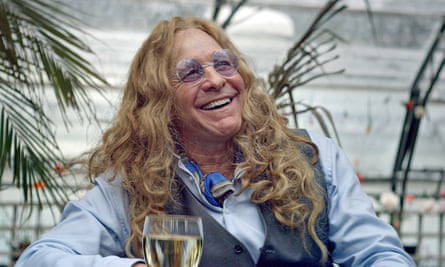
“The new ones are terrific, too, like Lock, Stock,” he adds. “There’s a coldness and brutality to British gangsters that keeps you engaged. Also, because everyone speaks in a British accent, you think they’re all intelligent.”
Still, it’s a bit of a shock to fans to see him playing such a foul-mouthed psychopath. “I was very fortunate in the 80s to build up this brand. Bill Shatner said to me once: ‘If you can get a character that people identify with you, you’re the luckiest human in the world. You’re Zorro, you’re Captain Kirk, you’re Rocky, you’re James Bond. And you’re Mahoney!’”
Exactly. You’re Mahoney, I say.
“But one actor I love to follow is Jack Nicholson,” he continues. “And he said: ‘You’re an actor. Keep popping up in different holes.’ Jack Lemmon did that beautifully. Tom Hanks does it beautifully. The audience wants your greatest hits, but I’ll also show you some new stuff.”
Guttenberg is talking to me by Facetime from his sister Susan’s home in Arizona, where he is visiting his parents who live with her. At 62, he has still got those familiar doe brown eyes, the dark curly hair, and even though it’s only 7am, he has already been up for an hour. He always had a strong work ethic, so much so that in the 1980s he was officially the busiest working actor, cranking out nine leading roles in four years. Yet even at the peak of his fame, when he became so ubiquitous that his surname is still a Proustian madeleine for 80s comedies, his reputation was of down-to-earth normalcy. No Eddie Murphy-style entourages or Sean Penn-esque brawling for Guttenberg.
“My work ethic and my nature come from my mom and dad. We’re working-class people and even at times when I got paid enormous amounts of money, that didn’t change the way I worked: I got up early, I made sure I had my tools, and I worked. The reality is, it’s a job. If you believe you’re a celebrity, you’re fucked, pardon my French,” he says.
Not that he didn’t enjoy the bounties of success. “Being a movie star is the No 1 job in the world! You get picked up, taken to work, they call you by your last name: ‘Hello, Mr Guttenberg, hello, Mr Clooney. Would you like a breakfast burrito?’ I’d love one, thanks!” he recalls fondly. And the after-hours life wasn’t too shabby either. When he was making Three Men and a Baby, he would go out afterwards every night with his co-stars, Tom Selleck and Ted Danson.
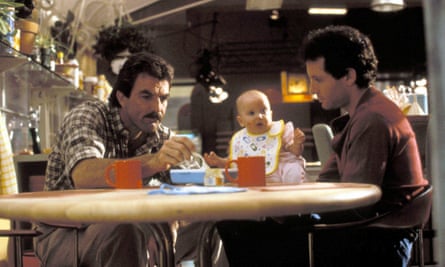
“There’s nothing like being with superstars. The three of us created such a stir! Tom and Ted really know how to live and we’d create pandemonium in the restaurants. With Tom and Ted – forget it! You can’t go more than one step without being mobbed! They were both so great-looking, but in relationships, whereas I was single. So hordes and hordes of women would come over and eventually they would trickle down to me hahaha!”
Unlike a lot of 80s comedies, Three Men and a Baby holds up surprisingly well, due in no small part to the charisma of the leads. The only thing that dates it, really, is how priapic the male characters are, verging on lecherous, trying it on with every woman that breathes. Was this to reassure audiences that these three wealthy men were heterosexual, despite living together for no obvious reason, and Selleck wearing some of the tiniest pairs of shorts ever committed to film?
“We did discuss that. But Leonard [Nimoy, who directed the film – yes, that Leonard Nimoy] was very, very bright, and his dramaturgy was excellent. He said: ‘If you don’t talk about it, it’s not real.’ So we all followed Leonard’s direction and he was right.”
If you were a kid in the 80s, there is a good chance that Guttenberg was your favourite actor, because he made movies that hit the sweet spot: funny enough for kids to love them, vanilla enough for parents to allow them. He was safer than Bill Murray, sunnier than Michael Keaton, more predictable than Hanks. Some have been snooty about his meteoric success: “Who makes Steve Guttenberg a star? We do!” sang the Stonecutters in The Simpsons, implying his career was a quasi-Masonic plot. But this underestimates the simple joys of Guttenberg’s handsome face, his soothing voice, his lovely comic timing.
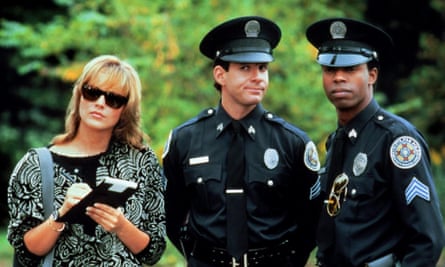
It also inadvertently nails his appeal: he always seemed like an ordinary guy who somehow became, for one decade only, one of the biggest stars on the planet. That’s what we liked about him. He was the Cinderella of Hollywood, and for a brief period of time, he got to go to the ball.
A lot of the nostalgia for Guttenberg is due to his performance as Mahoney, whom Shatner rightly described as Guttenberg’s Rocky. Guttenberg is extremely endearing in the Police Academy films, side-eyeing and wise-cracking his way through police school, and he starred in the first four movies, leaving numbers five to seven to the new generation of recruits. Did Mahoney feel like a shoe that fit from the moment he read the script?
“Absolutely, I knew that role. It was a cross between An Officer and a Gentleman and Stripes. But I had to screen-test for it, because they offered it to Michael Keaton first and he turned it down,” he says. I don’t see many connections between Keaton and Guttenberg, but I may be in the minority: when I ask Guttenberg what’s the best thing a fan ever said to him, he recalls the time a guy came up to him and shouted: “You’re Batman!”
Guttenberg’s fame spanned the decade perfectly, from his career-making performance in Barry Levinson’s Diner in 1982 to Three Men and a Little Lady in 1990. He then took a five-year break, and although he came back, his career never returned to what it was. There was a movie with the Olsen twins, a less than successful foray into directing, a couple of TV appearances, and probably his funniest recent work has been satirising himself, such as when he played himself on the cult comedy series Party Down, and when he made the spoof video of Will Ferrell’s website, Funny or Die, in which he appeared to be jogging naked through a park (“Wasn’t that hilarious?”). So what actually happened in those lost five years?
“You know, my great-grandfather was a horse thief,” he begins, settling back in his chair with his coffee. “He escaped the pogroms and lived in Liverpool for five years before coming to the US. So I sing to my own tune. I just had other things that I wanted to do.”
Guttenberg was born and raised in New York, an only son with two sisters, Susan and Judy, in a Jewish family that Guttenberg describes as “religious, but not observant”. He himself became observant when he started acting, mainly because he was so lonely out in LA that he went to synagogue on Fridays and Saturdays for the company.
“I found it to be such a friendly place: the camaraderie, the older ladies offering me nosh. So I just carried on. I know my cantor and rabbis very well,” he says. He started acting while in high school and, after a year at college, he dropped out and went west to try his luck in Hollywood. Did he have a career plan?
“I wanted to be a movie star! I really didn’t want to be a starving artist, I wanted to be a successful movie star,” he says.
Although Guttenberg is most commonly associated with actors such as Selleck, Danson and Michael Winslow, the man who makes the funny noises in Police Academy, one of his first major roles when he was 20 was in The Boys from Brazil, with Gregory Peck playing Josef Mengele, and Laurence Olivier as a Nazi hunter. What did Guttenberg learn from Peck and Olivier?
“A ton, without realising it. My mom, dad and sisters took me to the airport because it was my first international flight, and I was flying over to Lisbon with Greg Peck. My mom brought a salami sandwich and she gave it to him and said: ‘If my son gets hungry on the flight, will you give him this?’ And he said: ‘Of course, it will be my pleasure,’” Guttenberg recalls, doing a pretty good Peck impression.
While the movie’s stars – James Mason, Peck and Olivier – were staying in the Ritz in Lisbon, newbie Guttenberg was in a smaller hotel. But Peck made sure to include him in the big-cast dinners at night, and it was at one of those that young Guttenberg spoke up and said he didn’t think “Lord Olivier’s” (“Call me Larry, dear boy”) monologue was working, that the point didn’t come across. The table went silent. Franklin Shaffner, the movie’s director, leaned across the table to Guttenberg and said: “Steven, the greatest living actor will be saying those words. The point will come across.”
“So I learned humility from them. And punctuality – they were always on time and they never complained. They taught me this is a job, and you do it well,” says Guttenberg.
Four years later he was cast in the still hugely influential Diner – which went on to inspire Swingers and most of Judd Apatow’s oeuvre – alongside fellow then near-unknowns Mickey Rourke, Kevin Bacon, Paul Reiser, Daniel Stern and Ellen Barkin. Who was he closest to on that movie?
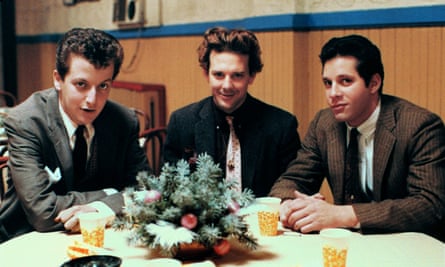
“Kevin and I spent a great deal of time together, and Mickey and I got very close. We used to do acting classes together in his room,” he says. It’s hard to imagine two actors more different than Rourke and Guttenberg, but he says they acted together “really well”.
Guttenberg got married two years ago “to the lovely Emily Smith”, and he remains extremely close to his family, so much so that he and Emily will soon be moving from their home in southern California to Arizona, to be close to his parents. “I never had children when I was younger, but it’s a thought now. It’s exciting!” he says. Most people, he says, are nice to him when they hear his name: “The greatest feeling I get is when my mother goes into a coffee shop and they say: ‘Your son is Steve Guttenberg? Have a free bagel and a schmear!’” he grins.
But sometimes people say mean things: they tell him he sucks, or that his career tanked. Does that upset him? “You know, [mob boss] John Gotti had a great line that I think about when people come up and say: ‘You’re not Tom Hanks, you’re not Olivier.’ He said: ‘I became everything I wanted to become – how about you?’ And I did! I wanted to be a movie star, and I achieved my little plan. This business has been better than terrific to me. It allowed me to help my sisters, my parents, my grandmother. It’s been extraordinary, and I’m grateful every day.”
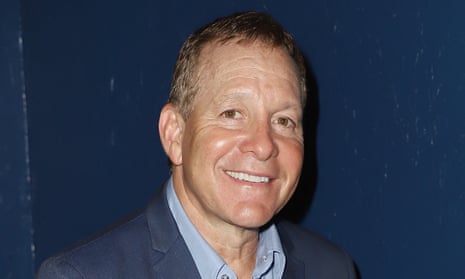
Comments (…)
Sign in or create your Guardian account to join the discussion